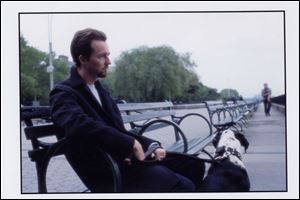
25th Hour: Rage illuminates N.Y. love letter
1/24/2003
Monty Brogan (Edward Norton) must leave the life he knew.
Spike Lee's 25th Hour, an engaging and melancholy day-in-the-life drama about a middle-rung drug dealer (Edward Norton) headed to prison for seven years, will forever be known as the first major studio release to explicitly address the mood and morning-after appearance of post-9/11 New York City. At turns bitter and lovely, brutal and sad, it's also simultaneously an elegy, a blues number, and a poem, seemingly filmed in a dozen lonesome shades of moon-rise blue and rainy-day gray.
The screenplay and novel it's based on were both written by David Benioff well before the terrorist attacks on the World Trade Center; and smartly, Lee doesn't make any literal connection between that tragedy and the film's wandering story. But there's a sense he can't look away, and the city's mood of defiance and unease becomes not his subject but the emotional backdrop.
Of course, the director of Do the Right Thing, Summer of Sam, and Malcolm X is one of our quintessential Gotham directors, a peer of Woody Allen and Martin Scorsese. But Lee's New York is more nuanced. He sees the city not in the exaggerated romance or grit of Hollywood New York, with Louis Armstrong scatting and cabbies barking and blood running in the gutter, but with the cranky, complicated affection one normally reserves for family members. This is how Monty Brogan (Norton) regards his hometown, too; his story (in a nutshell: ratted out and sentenced to seven years upstate) plays like a hook for expressing exasperated love, and the muted daze that comes from monumental loss.
As Terrence Blanchard's majestic orchestral jazz swells, the film opens with a shot of the two beams of light that memorialized the tragedy. From there Monty walks his dog past sidewalk altars and rows of American flags. He is a man whose life is over, strolling through a city forever changed. Two hours later the movie ends with a thundering song from Bruce Springsteen's own 9/11 elegy, The Rising, playing over the closing credits. It's an unlikely touch, but also oddly perfect. Indeed, there's a moment just before it when the American Dream itself is summoned and played with such heartbreaking power that Lee seems to channel vintage Springsteen and its evocations of Eastern seaboard misfits and losers who've blown their last shot at making a life.
Lee travels to the prep schools uptown. Monty's old friend Jacob (Philip Seymour Hoffman) is a stammering high school teacher with a crush on one of his students (Anna Paquin). Monty asks to see him one last time, so Jacob heads downtown and rounds up a mutual friend, Slaughtery (Barry Pepper), an investment banker with an apartment overlooking Ground Zero. The scene with Hoffman and Pepper chatting in a window seat while the camera fixes on dump trucks and floodlights below is like the movie itself: moving and too heated to focus, more a misstep of ambition than sloppiness.
Lee has so much to say and show that at times it all piles up awkwardly. He doesn't know exactly what to do with the crush of emotions and damaged friendships. But then neither does Monty. He prepares for his last night by visiting with his girlfriend (Rosario Dawson), who may have set him up, and his father (Brian Cox), a retired firefighter who owns a Staten Island pub that's become a shrine to fallen comrades. It's also the location of the film's best scene. With less than a day to wrap up loose ends and bid farewell, Monty walks into the bathroom and reads an obscenity scrawled on the mirror, and leaps off it with invective of his own, spit out like a Def Jam poetry slam.
If Norton is a bit reedy to come off as menacing, the moment itself is an electrifying flourish, recalling a similar scene in Do the Right Thing. With only himself to witness it, Monty launches into a tirade against every ethic, profession, and socio-economical group in New York City and beyond: the Russians sipping tea in Brooklyn, the cabbies who don't know their way around, the Italians and their undershirts, the poor, the rich, police officers, priests, Wall Street bankers, Enron executives, Osama bin Laden, George W. Bush, the New York Knicks, finally ending with Monty Brogan himself, a guy who got greedy.
Monty's rage is frothing, rancid, expansive, and ultimately, the more he lingers over every detail of every target, the more Blanchard's score swells behind Lee's images of every walk of life, deeply touching. Like anyone intimate with New York, Monty starts with a scorched-earth attitude toward the place but can't help delivering a love letter.